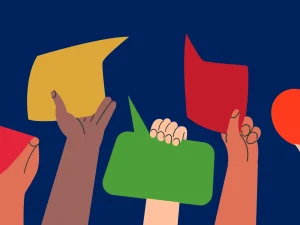Today’s children are socially aware and politically engaged; they understand the power that politicians have to directly impact their lives. They saw it first-hand during Covid.
One of the strongest messages to come out of The Big Ambition was the desire for a fairer and more equitable world. Children want to change the world, they care about it, and they want to have their voices heard.
The Big Ambition results revealed children’s passions and frustrations. They felt that because they couldn’t vote no one was interested in listening to what they had to say and that their voices didn’t matter.
As Children’s Commissioner, it’s clear to me that their voices are vital. They don’t have the vote, but they are 100 per cent of the future and we need to listen. That’s why I called on party leaders to hold a leaders’ debate for children when the election was announced. I want to see children’s views being listened to by whoever wins the election. Listened to and acted upon.
My young Ambassadors have been sharing their views on each of the themes from The Big Ambition, today concluding with a better world:
Poppy:
When I grow up, my dream is to make the world a better place. Whether that be internationally or in my small corner of the world – but my dream shouldn’t be limited by age, and this is a common sentiment felt by numerous young people.
Young people possess the passion, creativity, and resilience needed to create a better world. If change-makers harnessed our potential and empowered us to act, we could shape a much brighter future for everyone. We could make an impact.
Young people are unique in the sense that we have fresh perspectives not tarnished by conventional thinking. We have innovative and creative solutions to societal challenges. We have the power to bring hope and optimism to the world. Quite frankly, we have the power to make the world a better place.
We are the future, and we should be treated as such. At the heart of a better world lies inclusivity and empathy. We cannot discriminate in anyway. Everyone deserves to have their voices heard so we can create a world in which individuals and nations prioritise listening and learning from each other, fostering genuine connections, fuelling peace and cooperation creating a complete sense of unity. To do this, we must build platforms for people to be listened to. Decision makers at all levels need to listen to children. Every school, constituency, government department and council need to have young voices that are valued and directly influence policymaking.
Mehul:
For many young people the issues of pollution and sustainability are the biggest threat facing future generations. We are growing up in an era marked by environmental degradation, climate change and pollution which pose a direct threat to our health, development and future prospects.
Exposure to air pollutants such as particulate matter and nitrogen dioxide can lead to respiratory problems, asthma, and other health issues, disproportionately affecting vulnerable populations, especially children, whose developing bodies are more susceptible to the adverse effects of pollution.
Addressing these pressing environmental challenges requires concerted efforts and bold action from decision makers.
How much and how quickly we invest in a green future has been widely debated, but one of the easiest places to start is by educating children on the environment.
Education is crucial in empowering children to become agents of change and advocates for a sustainable future, equipping them with the knowledge and the skills to make informed decisions and protect the planet.
By adopting a holistic approach that prioritizes environmental sustainability, promotes social equity, and prioritizes the well-being of future generations, we can work together to address pollution and build a healthy and sustainable world for all living things.





